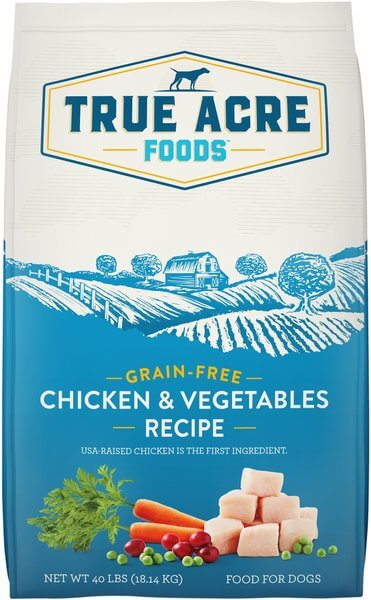
DogFoodAdvisor is reader supported See how
All reviews are 100% impartial but if you buy using links on this page, we may earn a referral fee.
Our Verdict
True Acre dry product range is made up of four recipes with ratings varying from 3.5 to 4 stars. The average rating of the whole range is 3.5 stars.
The table below shows each recipe in this range including our rating and the AAFCO nutrient profile: Growth (puppy), Maintenance (adult), All Life Stages, Supplemental or Unspecified.
| Product line | Rating | AAFCO |
|---|---|---|
| True Acre Chicken and Vegetables Grain Free | 3.5 | A |
| True Acre Beef and Vegetables Grain Free | 3.5 | A |
| True Acre Chicken and Vegetables Large Breed Grain Free | 3.5 | A |
| True Acre Chicken and Vegetables Weight Control Grain Free | 4 | M |
Recipe and Label Analysis
True Acre Chicken and Vegetables Grain Free was selected to represent the other products in the line for detailed recipe and nutrient analysis.
True Acre Chicken and Vegetables Grain Free
Estimated Dry Matter Nutrient Content
Protein
Fat
CarbsCarbohydrates
Chicken, peas, pea starch, canola meal, poultry by-product meal, soybean meal, poultry fat (preserved with mixed tocopherols), tapioca starch, natural flavor, dried plain beet pulp, dicalcium phosphate, salt, fish oil, flaxseed, calcium carbonate, carrots, cranberries, l-threonine, choline chloride, mixed tocopherols (preservative), vitamin E supplement, ferrous sulfate, iron amino acid chelate, zinc amino acid chelate, zinc oxide, dl-methionine, copper sulfate, sodium selenite, niacin supplement, d-calcium pantothenate, copper amino acid chelate, manganese amino acid chelate, riboflavin supplement, vitamin A supplement, manganous oxide, thiamine mononitrate, vitamin D3 supplement, vitamin B12 supplement, pyridoxine hydrochloride, calcium iodate, folic acid, rosemary extract
Fiber (estimated dry matter content) = 5%
Red denotes any controversial items
| Estimated Nutrient Content | |||
|---|---|---|---|
| Method | Protein | Fat | Carbs |
| Guaranteed Analysis | 24% | 13% | NA |
| Dry Matter Basis | 27% | 15% | 50% |
| Calorie Weighted Basis | 24% | 32% | 44% |
Ingredients Analysis
The first ingredient in this dog food is chicken. Although it is a quality item, raw chicken contains up to 73% water. After cooking, most of that moisture is lost, reducing the meat content to just a fraction of its original weight.
After processing, this item would probably account for a smaller part of the total content of the finished product.
The second ingredient includes peas. Peas are a quality source of carbohydrates. And like all legumes, they’re rich in natural fiber.
However, peas have about 25% protein, a factor that must be considered when judging the meat content of this dog food.
The next ingredient is pea starch, a paste-like, gluten-free carbohydrate extract probably used here as a binder for making kibble. Aside from its energy content (calories), pea starch is of only modest nutritional value to a dog.
Next on the ingredients list is canola meal, a by-product of canola oil production more typically used to make feed for farm animals and to produce biodiesel.
Unfortunately, canola can be a controversial item. That’s because it can sometimes (but not always) be derived from genetically modified rapeseed.
In any case, because canola meal also contains about 37% dry matter protein, this ingredient would be expected to notably boost the total protein reported on the label — a factor that must be considered when judging the actual meat content of this dog food.
The fifth ingredient is poultry by-product meal, a dry rendered product of slaughterhouse waste. It’s made from what’s left of slaughtered poultry after all the prime cuts have been removed.
In addition to organs, this item can also include feet, beaks, undeveloped eggs and almost anything other than prime skeletal muscle.
On the brighter side, by-product meals are meat concentrates and contain nearly 300% more protein than fresh poultry.
The quality of this ingredient can vary, depending on the caliber of the raw materials obtained by the manufacturer.
We consider poultry by-products slightly lower in quality than a single-species ingredient (like chicken by-products).
The sixth ingredient is soybean meal, a by-product of soybean oil production more commonly found in farm animal feeds.
Although soybean meal contains 48% protein, this ingredient would be expected to have a lower biological value than meat.
And less costly plant-based products like this can notably boost the total protein reported on the label — a factor that must be considered when judging the actual meat content of this dog food.
The seventh ingredient is poultry fat. This item is obtained from rendering, a process similar to making soup in which the fat itself is skimmed from the surface of the liquid.
Poultry fat is high in linoleic acid, an omega-6 fatty acid essential for life.
However, poultry fat is a relatively generic ingredient and can be considered lower in quality than a similar item from a named source animal (like chicken fat).
The eighth ingredient is tapioca starch, a gluten-free, starchy carbohydrate extract made from the root of the cassava plant.
From here, the list goes on to include a number of other items.
But to be realistic, ingredients located this far down the list (other than nutritional supplements) are not likely to affect the overall rating of this True Acre product.
With six notable exceptions…
First, this food includes beet pulp. This is a controversial ingredient, a high fiber by-product of sugar beet processing.
Some denounce beet pulp as an inexpensive filler while others cite its outstanding intestinal health and blood sugar benefits.
We only call your attention here to the controversy and believe the inclusion of beet pulp in reasonable amounts in most dog foods is entirely acceptable.
Next, the recipe contains flaxseed, one of the best plant sources of healthy omega-3 fatty acids. Provided they’ve first been ground into a meal, flax seeds are also rich in soluble fiber.
However, flaxseed contains about 19% protein, a factor that must be considered when judging the actual meat content of this dog food.
In addition, fish oil is naturally rich in the prized EPA and DHA type of omega-3 fatty acids. These two high quality fats boast the highest bio-availability to dogs and humans.
Depending on its level of freshness and purity, fish oil should be considered a commendable addition.
Also worth noting is the inclusion of sodium selenite, a controversial form of the mineral selenium. Sodium selenite appears to be nutritionally inferior to the more natural source of selenium found in selenium yeast.
Next, we find no mention of probiotics, friendly bacteria applied to the surface of the kibble after processing to help with digestion.
And lastly, this food contains chelated minerals, minerals that have been chemically attached to protein. This makes them easier to absorb. Chelated minerals are usually found in better dog foods.
Nutrient Analysis
Based on its ingredients alone, True Acre looks like an average dry dog food.
The dashboard displays a dry matter protein reading of 27.3%, a fat level of 14.8% and estimated carbohydrates of about 50%.
As a group, the brand features an average protein content of 28.1% and a mean fat level of 13.4%. Together, these figures suggest a carbohydrate content of 50.5% for the overall product line.
And a fat-to-protein ratio of about 48%.
Which means this True Acre product line contains…
Above-average protein. Below-average fat. And above-average carbs when compared to a typical dry dog food.
When you consider the protein-boosting effect of the peas, canola meal, soybean meal and flaxseed, this looks like the profile of a kibble containing a moderate amount of meat.
True Acre Dog Food Recall History
The following automated list (if present) includes all dog food recalls related to True Acre through July 2024.
No recalls noted.
You can view a complete list of all dog food recalls since 2009 here.
Our Rating of True Acre Dog Food
True Acre lists both grain-free and grain-inclusive dry dog foods using a moderate amount of named by-product meal as its dominant source of animal protein, thus earning the brand 3.5 stars.
Compare True Acre Dog Food
How does True Acre compare with The Dog Food Advisor's most recommended brands?
A Final Word
The Dog Food Advisor does not accept money, gifts, samples or other incentives in exchange for special consideration in preparing our reviews.
However, we do receive a referral fee from online retailers (like Chewy or Amazon) and from sellers of perishable pet food when readers click over to their websites from ours. This helps cover the cost of operation of our free blog. Thanks for your support.
For more information, please visit our Disclaimer and Disclosure page.









